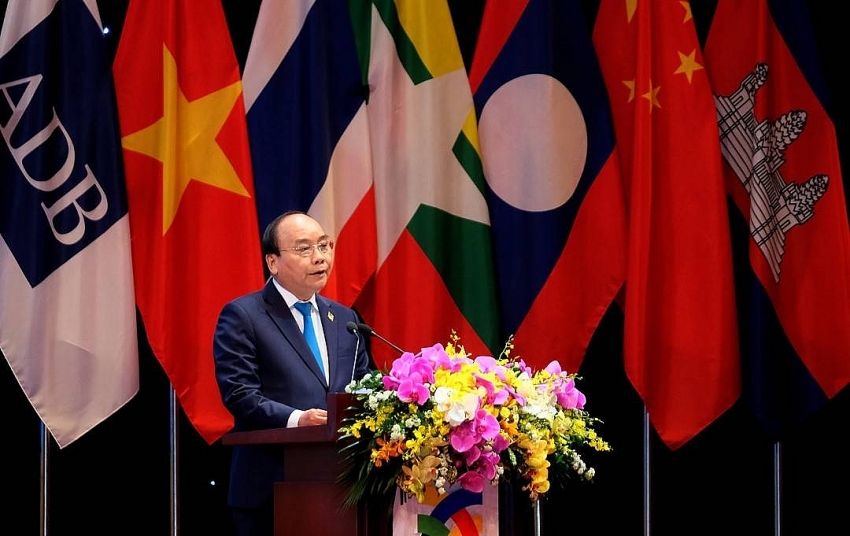PM promises 5-7 per cent corporate income tax cuts at GMS Summit
 |
| Prime Minister Nguyen Xuan Phuc at the sixth GMS Summit |
“We have been working to meet our commitments to protect intellectual property rights, innovative ideas, and the inventions of startups. We will continue to boost tax policy reforms and corporate income tax will be decreased to 15-17 per cent from the current 20-22 per cent,” stated Prime Minister Nguyen Xuan Phuc at the sixth Greater Mekong Subregion (GMS) Summit.
At the summit, the PM said that in 2017, Vietnam continued to maintain one of Asia’s highest economic growths, with inflation controlled at 3.5 per cent. The country’s interest and exchange rates remained stable, trade turnover reached a record $425 billion, and foreign reserves have exceeded $60 billion.
According to the World Bank, Vietnam’s Ease of Doing Business Index last year jumped 14 places to stand 68th among 190 economies. The World Economic Forum (WEF) placed Vietnam’s Global Competitiveness Index (GCI) at 55th out of 137 countries, 5 places higher than last yeas. The World Intellectual Property Organization (WIPO) ranked Vietnam’s Global Innovation Index (GII) at 47th out of 127 countries, 12 places higher than last year.
At present, there are about 25,000 FDI projects implemented in Vietnam, with the total registered investment capital exceeding $320 billion. In 2017, the VN Index has risen by 41 per cent, ranking among the world’s top three.
| These achievements have shown the trust and enthusiasm of investors and entrepreneurs in response to our government’s efforts to reform and innovate over the past years. They also motivate us to confidently proceed with further reforms. |
“These achievements have shown the trust and enthusiasm of investors and entrepreneurs in response to our government’s efforts to reform and innovate over the past years. They also motivate us to confidently proceed with further reforms,” noted the PM.
First, Vietnam determined to build an enabling, action-oriented government in the service of its people and businesses. The state does not take over the work of the market and businesses, and will instead focus on creating a favorable environment for development, improving institutional and legal groundwork, and enhancing management capacity in order to bring about equal opportunities for all economic sectors.
The state pays attention to human resources training, infrastructure development, and only considers investing into important areas which have proved difficult for private businesses to invest in.
Second, Vietnam will continue to improve the business environment to make it more conducive and competitive. The country will strive to become one of the ASEAN’s leading economies.
Third, Vietnam will further promote active international integration in GMS and CLV, focusing on the signing and ratification of the two new-generation free trade agreements, namely the Comprehensive and Progressive Trans-Pacific Partnership (CPTPP) and the EU-Vietnam Free Trade Agreement (EVFTA). At the same time, the country will effectively implement the ten FTAs currently in effect and accelerate negotiations of the Regional Comprehensive Economic Partnership (RCEP) and other agreements.
With the CPTPP and EVFTA coming into effect, Vietnam will have highly preferential free trade relations with the markets of nearly 40 developed countries.
Fourth, as one of the three pillars of the GMS, the Vietnamese government currently prioritises investing and attracting investment in vital transport routes. In addition to already-funded expressways such as Ho Chi Minh City-Can Tho-Ca Mau, Hanoi-Haiphong, Hanoi-Lao Cai (connecting to Kunming, China), and Hanoi-Lang Son (connecting to Nanjing, China), Vietnam also works to connect the “two corridors, one economic belt” framework with the Belt and Road Initiative.
Vietnam is actively promoting investment in transport infrastructure on the East-West, North-South, and southern economic corridors.
Furthermore, the Vietnamese government commits to implementing initiatives and is currently translating them into reality through prioritising investment in connectivity infrastructure to support border trade, investment, tourism, agriculture, and economics, as well as other forms of cross-border economic cooperation. The country also emphasises investing in the development of human resources of compatible skills and capacity.
What the stars mean:
★ Poor ★ ★ Promising ★★★ Good ★★★★ Very good ★★★★★ Exceptional
Related Contents
Latest News
More News
- A golden time to shine within ASEAN (February 19, 2026 | 20:22)
- Vietnam’s pivotal year for advancing sustainability (February 19, 2026 | 08:44)
- Strengthening the core role of industry and trade (February 19, 2026 | 08:35)
- Future orientations for healthcare improvements (February 19, 2026 | 08:29)
- Infrastructure orientations suitable for a new chapter (February 19, 2026 | 08:15)
- Innovation breakthroughs that can elevate the nation (February 19, 2026 | 08:08)
- ABB Robotics hosts SOMA Value Provider Conference in Vietnam (February 19, 2026 | 08:00)
- Entire financial sector steps firmly into a new spring (February 17, 2026 | 13:40)
- Digital security fundamental for better and faster decision-making (February 13, 2026 | 10:50)
- Aircraft makers urge out-the-box thinking (February 13, 2026 | 10:39)

 Tag:
Tag:


















 Mobile Version
Mobile Version